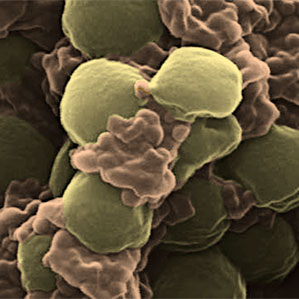Nanoparticles disguised as platelets, cells that circulate in the blood and form clots to stop bleeding from injured vessels, could serve as potent antibiotic treatments against certain hard-to-treat bacterial infections, according to new research.
Platelets also naturally adhere to certain invasive microörganisms. Aiming to take advantage of this, a group led by Liangfang Zhang, a professor of nanoengineering at the University of California, San Diego, has developed a way to wrap platelet membranes around tiny particles made of an FDA-approved biodegradable polymer. They’ve shown that the particles, when loaded with strong antibiotics, can target and treat drug-resistant Staphylococcus aureus (MRSA), a tough-to-kill and sometimes deadly bacterium that is a common source of infections in hospitals.
The researchers tested the treatment on mice with severe MRSA infections. They found that the new therapy was a more potent killer of the bacteria than doses that were six times larger of the same antibiotic without the nanoparticles…
Source: MIT Technology Review




